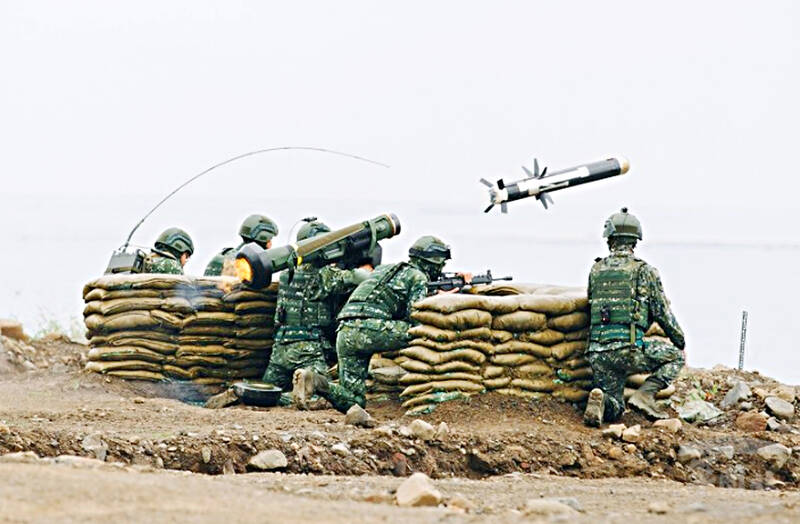The army is to receive 1,240 tube-launched, optically tracked, wire-guided (TOW) 2B and 200 Javelin anti-tank guided missiles next year, the Ministry of National Defense’s budget showed, in a sign that Taiwan’s arms orders were not affected by the war in Ukraine.
The army allocated a budget for 1,700 TOW missiles to be delivered between 2018 and 2025, and 400 Javelin missiles with 42 command launch units to be delivered between 2019 and next year, the ministry’s general budget for fiscal year 2024 submitted to the Legislative Yuan showed.
The schedules in the published budget are well within the timetables disclosed to the legislature at the time the deals were announced.

Photo courtesy of Military News Agency
The nation has received 460 TOW 2B missiles and next year’s shipments would complete the order.
Taiwan has received half of the Javelin missiles it ordered, with the rest to arrive next year if the legislature approves the army’s proposed NT$400 million (US$12.5 million) allocation.
The defense ministry’s general budget for fiscal year 2024 showed that it is to buy from the US 11 High Mobility Artillery Rocket Systems (HIMARS), which are to be delivered next year.
The proposed NT$6.85 billion budget would fund the procurement of artillery systems, two training simulators and 64 Army Tactical Missile Systems (ATACM) in addition to maintenance and operating costs, the ministry said in the document.
The acquisition would provide the armed forces with an artillery system capable of delivering long-range precision strikes against area targets and high mobility to repel an amphibious attack on the nation, the ministry said.
A tranche of 18 HIMARS, 864 Guided Multiple Launch Rocket Systems and 20 ATACMs are expected to be delivered by 2027 to replace a dropped bid for M109A6 self-propelled howitzers, it said.
With the new additions, the military can fire 114 full salvos of six rockets and 84 ATACM strikes, the ministry said.
The combined costs of the two arms packages and related maintenance were estimated to be NT$32.5 billion, it said.
Taiwan’s first group of 30 HIMARS operators and maintenance technicians are to be trained in the US and then return to become instructors, the ministry said, adding that it aims to create an indigenous capability to maintain the weapons.
Their training is scheduled to take place from February to October next year, the ministry said.
Meanwhile, the armed forces are to buy about NT$1.49 billion of helmets, bullet-resistant vests and ballistic plates in the next three years to equip conscripts who are expected to join the ranks following the reinstatement of the mandatory military draft, it said.
That figure includes NT$1.32 billion for the army, NT$47.7 million for the navy and NT$135 million for the air force, it said, adding that light arms and mortars would be purchased through a separate budget.
Additional reporting by Wu Su-wei

The Central Election Commission has amended election and recall regulations to require elected office candidates to provide proof that they have no Chinese citizenship, a Cabinet report said. The commission on Oct. 29 last year revised the Measures for the Permission of Family-based Residence, Long-term Residence and Settlement of People from the Mainland Area in the Taiwan Area (大陸地區人民在台灣地區依親居留長期居留或定居許可辦法), the Executive Yuan said in a report it submitted to the legislature for review. The revision requires Chinese citizens applying for permanent residency to submit notarial documents showing that they have lost their Chinese household record and have renounced — or have never

A magnitude 5.6 earthquake struck off the coast of Yilan County at 12:37pm today, with clear shaking felt across much of northern Taiwan. There were no immediate reports of damage. The epicenter of the quake was 16.9km east-southeast of Yilan County Hall offshore at a depth of 66.8km, Central Weather Administration (CWA) data showed. The maximum intensity registered at a 4 in Yilan County’s Nanao Township (南澳) on Taiwan’s seven-tier scale. Other parts of Yilan, as well as certain areas of Hualien County, Taipei, New Taipei City, Taoyuan, Hsinchu County, Taichung and Miaoli County, recorded intensities of 3. Residents of Yilan County and Taipei received

Taiwan has secured another breakthrough in fruit exports, with jujubes, dragon fruit and lychees approved for shipment to the EU, the Ministry of Agriculture said yesterday. The Animal and Plant Health Inspection Agency on Thursday received formal notification of the approval from the EU, the ministry said, adding that the decision was expected to expand Taiwanese fruit producers’ access to high-end European markets. Taiwan exported 126 tonnes of lychees last year, valued at US$1.48 million, with Japan accounting for 102 tonnes. Other export destinations included New Zealand, Hong Kong, the US and Australia, ministry data showed. Jujube exports totaled 103 tonnes, valued at

BIG SPENDERS: Foreign investors bought the most Taiwan equities since 2005, signaling confidence that an AI boom would continue to benefit chipmakers Taiwan Semiconductor Manufacturing Co’s (TSMC, 台積電) market capitalization swelled to US$2 trillion for the first time following a 4.25 percent rally in its American depositary receipts (ADR) overnight, putting the world’s biggest contract chipmaker sixth on the list of the world’s biggest companies by market capitalization, just behind Amazon.com Inc. The site CompaniesMarketcap.com ranked TSMC ahead of Saudi Aramco and Meta Platforms Inc. The Taiwanese company’s ADRs on Tuesday surged to US$385.75 on the New York Stock Exchange, as strong demand for artificial intelligence (AI) applications led to chip supply constraints and boost revenue growth to record-breaking levels. Each TSMC ADR represents